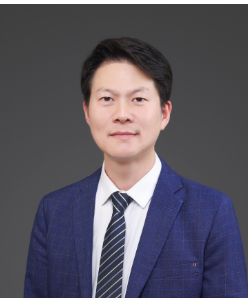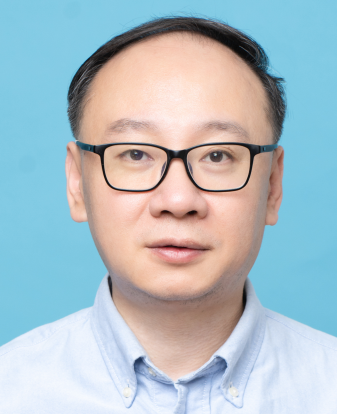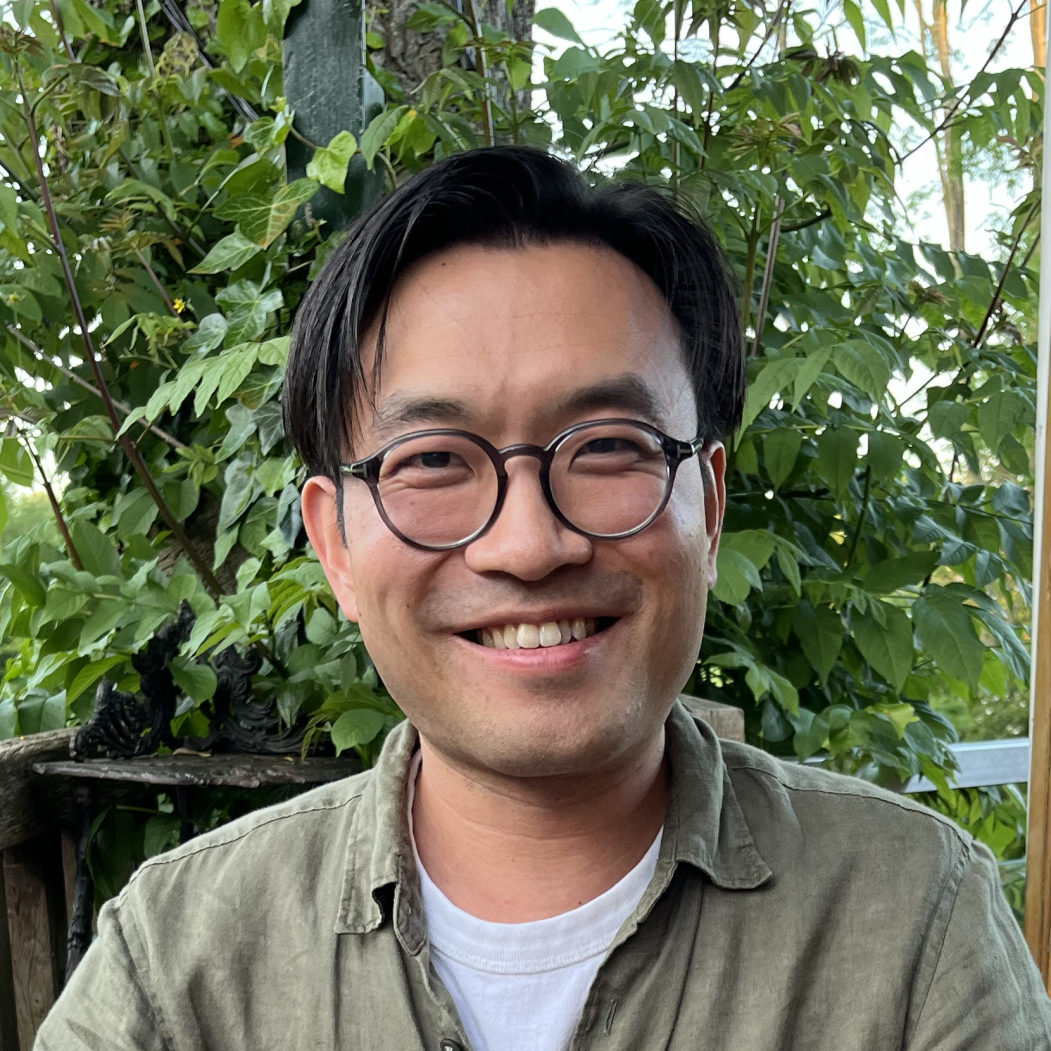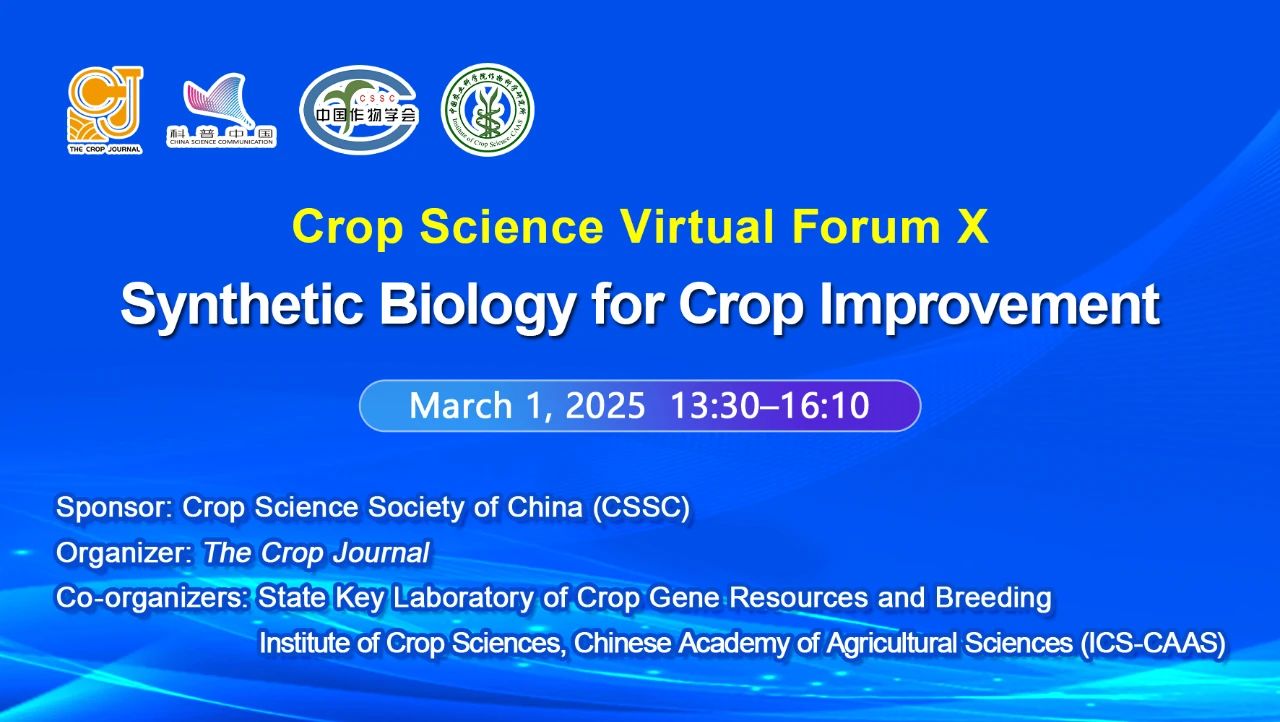
协办: 作物基因资源与育种全国重点实验室、中国农业科学院作物科学研究所Sponsor: Crop Science Society of China (CSSC)Organizer: The Crop JournalCo-organizers: State Key Laboratory of Crop Gene Resources and Breeding, Institute of Crop Sciences, Chinese Academy of Agricultural Sciences (ICS-CAAS)Topic: Synthetic Biology for Crop Improvement主持人:金双侠,The Crop Journal 编委毛龙(The Crop Journal 执行主编,中国农业科学院作物科学研究所)金双侠(The Crop Journal 编委,华中农业大学)
报告题目:“合成生物学促进作物改良”专辑征稿简介
报告题目:植物合成生物学工具开发与种质创新
报告题目:药用托品烷生物碱生物合成与生物制造
报告题目:基于组学大数据和蛋白结构模拟开发的植物酶基因改造策略
报告题目:基因编辑介导的生物强化:实现营养安全的可持续新策略
David Seung(John Innes Centre)
Moderator: Shuangxia Jin, Associate editor of The Crop Journal
13:30–13:35
Long Mao (Deputy Editor-in-Chief of The Crop Journal, ICS-CAAS)Title: Introduction to The Crop Journal
13:35–13:40
Shuangxia Jin (Associate editor of The Crop Journal, Huazhong Agricultural University)Title: Call for papers: Special issue on Synthetic Biology for Crop Improvement
13:40–14:10
Qinlong Zhu (South China Agricultural University)Title: Development of plant synthetic biology tools for germplasm innovation
14:10–14:40
Zhihua Liao (Southwest University)Title: Biosynthesis of medicinal tropane alkaloids and their Biomanufacturing
14:40–15:10
Yi Shang (Yunnan Normal University)Title: REvoDesign: a data-driven and structure-guided tool for plant enzyme engineering
15:10–15:40
Jie Li (Shanghai Jiao Tong University)Title: Biofortified crops by gene editing: a novel and sustainable route to nutrition sufficiency?
15:40–16:10
David Seung (John Innes Centre)Title: Understanding and engineering starch granule morphology in wheat to enhance grain qualityHuazhong Agricultural UniversityDr. Jin Shuangxia, the Second-level professor of Huazhong Agricultural University, Dean of College of Plant Science and Technology, winner of National Outstanding Youth Fund, Young Yangtze River Scholar of Ministry of Education, engaged in cotton biotechnology and insect-resistant genetic engineering research for 20 years. He has published more than 80 papers as corresponding author in high tier journal including: Nature Genetics, Genome Biology (5 articles), Advanced Science (4 articles), Trends in Plant Science (3 articles), Nature Communications, iMeta, Cell Reports, Plant Biotechnology Journal (8 articles), Plant Communications (3 articles), Plant Journal (3 articles), Plant Physiology (2 articles), etc. Among them, 12 papers are highly cited and hot papers, and were cited more than 8000 times. In 2021, he won the Cotton Biotechnology Award, an international authoritative award in the field of basic research in cotton. He is the Executive Editor of Plant Biotechnology Journal, Editor of Genome Biology, Associate editor of iMeta, and Associate editor of The Crop Journal.
South China Agricultural UniversityDr. Qinlong Zhu works in College of Agriculture at South China Agricultural University (SCAU) and previously served as a visiting associate professor at Cornell University from 2017–2018. He obtained his Ph.D. in Southwest University in 2004, and conducted postdoctoral research in the College of Life Sciences at SCAU from 2007–2011. His research focuses on developing innovative biotechnology tools for plant biosynthetic biology and genome editing, aiming to enhance bioactive compounds and nutritional quality in functional food crops. The research has been published in prestigious journals including Trends in Biotechnology, Biotechnology Advances, Molecular Plant, and Plant Biotechnology Journal.
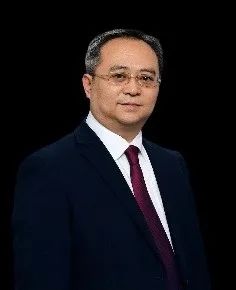
Southwest University
Dr. Zhihua Liao works in School of Life Sciences, Southwest University (SWU). He obtained Ph.D. in Fudan University in 2004, and joined SWU in 2004 and became a professor. His research interest is focusing on synthetic biology and biomanufacturing of plant natural products, especially medicinal tropane alkaloids and sweet wormwood terpenoids. The research work was published in Nature Communications, Metabolic Engineering, ACS Catalysis, Molecular Plant, etc. He obtained several patents and sold them to pharmaceutical companies.
Dr. Yi Shang, Chang Jiang Distinguished Professor (2022–2026), Chang Jiang Young Scholar (2018–2020); Director of the CAAS-YNNU-YINMORE Joint Academy of Potato Science, Yunnan Normal University; Vice director of the Yunnan Key Laboratory of Potato Biology. He focuses on the metabolic biology of vegetable crops and plant enzyme engineering using big genomic data and protein design technology. He have published 15 papers as first or corresponding author (including co-authors) in journals such as Science, Nature Plants, Nature Communications, Plant Cell and Molecular Plant, 5 of which were recommended by Faculty of 1000 (F1000). He is chief investigator over 5 National Natural Science Fund Projects and 4 Yunnan Science Fund Projects. He served as the member of Plant Metabolism Professional Committee of the Chinese Society of Plant Physiology (2019–2024). He have been granted 16 national invention patents.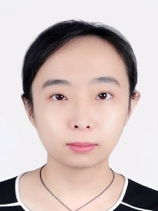
李洁
Shanghai Jiao Tong University
Dr. Jie Li is an Associate Professor and Independent Principal Investigator at the School of Agriculture and Biology of Shanghai Jiao Tong University. After the undergraduate study at China Agricultural University, she pursued her Ph.D. degree in Biological Sciences at the John Innes Centre, under the supervision of Professor Cathie Martin, later working as a Postdoctoral Researcher at JIC. She has a broad interest in biosynthesis and regulation of phytonutrients, along with strategies for enhancing nutrition in crops. In particular, she is researching biofortification to provide healthy food through innovative biotechnologies. Her work published in Nature Plants, Nature Food, etc., receiving a wide range of publicity from academia and industry.Dr. David Seung is a Group Leader at the John Innes Centre, Norwich (UK). He received his Bachelor Science degree in Plant Sciences and AgriculturalChemistry from the University of Sydney, and Master Science and Ph.D. degrees from ETH Zurich. David joined the John Innes Centre in 2017. Research in his lab aims to understand starch biosynthesis at the molecular level, including the initiation process of starch granules and the control of granule size, shape and polymer composition. The lab has recently been using genetic and biochemical approaches to elucidate mechanisms that underpin the vast natural diversity in starch morphology and composition among different species and organs. Systems of interest include the synthesis of leaf starch in Arabidopsis chloroplasts, as well as the synthesis of endosperm starch in amyloplasts of cereal grains – where starch granule traits have major implications on crop quality.

